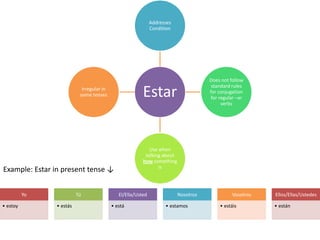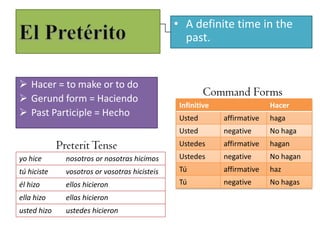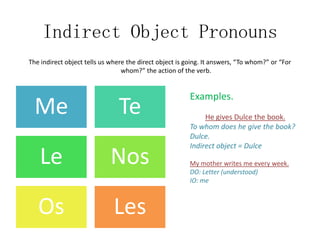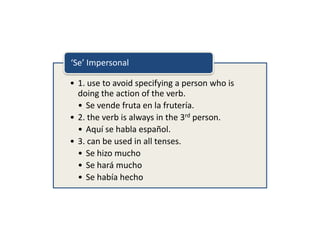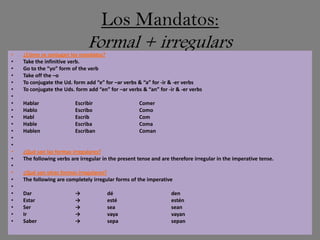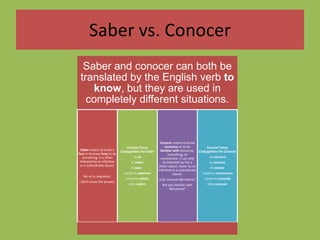Grammar workbook
- 1. Grammar WorkbookDulce SmithSpanish 2 Honors
- 2. ¡Table of Contents!SerEstarVerbs like GustarHacer ExpressionsPreteritosTrigger VerbsCar, Gar, ZarSpock VerbsCucaracha Verbs10. Snakes11. Snakeys12. CommandsDOP’sIOP’s15. Se Impersonal16. Past Participles as Adj17. El Futuro and ir + a + infinitive18. Demonstrative Adj19. Demonstrative Pronouns20. Imperfect Tense21. Los Mandatos: Informal + Irregulars22. Los Mandatos: Formal + Irregulars23. Los Mandatos: DOP + IOP placement24. Modal Verbs25. Reflexivos26. Saber vs. Conocer
- 3. Ser (to be)Addresses essential quality
- 4. Irregular
- 5. Use when talking about what something isExample: Estar in present tense ↓
- 6. Verbs like GustarThese do not use subject pronouns such as Yo or TÚ, instead they use the indirect object pronouns: me, te, le, nos, os, les.
- 7. They do not have six different endings accoring to the person doing the action. They only have two endings: one for singular, and one for plural The way to conjugate a verb like gustar:Singular FormMe gustaTe GustaLe GustaNosGustaOs GustaLes GustaPlural FormMe GustanTe GustanLe GustanNosGustanOs GustanLes GustanThe structure of gustar in sentences ↓Example:Me gusta el café.Example:Me gustanlasuvas.
- 8. What ever conjugated verb you use, it can be expressed in any tense!
- 9. El PretéritoA definite time in the past.Hacer = to make or to do
- 10. Gerund form = Haciendo
- 11. Past Participle = HechoCommand FormsPreterit Tense
- 12. Trigger Verbsaconsejarto advise(trigger) Desearto wish;to desire(trigger) Importarto be important; to matter(trigger)Insistirto insist(trigger)
- 13. -Car, -Gar, -Zarin the preterit formOnly changes in the first person!ToquéTocasteTocóTocamosTocaronJuguéJugasteJugóJugamosJugaronComencéComenzasteComenzóComenzamosComenzaronVerbs that end in -car change c to quVerbs that end in -gar change g to guVerbs that end in -zar change z to cThese are irregulars!
- 15. Cucaracha VerbsThe main goal for these verbs is to take the prefixes to the left and attach them with the following endings:-e-iste-o-imos-isteis-ieron
- 16. “Snakes” Snake verbs are irregular preterits. When using a verb that ends in “e”, it would change to the ending of –i. Or, if you are using a verb that ends in –o, it would go to the ending of –u. Snake verbs also only change in the 3rd person.Examples.YoTúUsted/él/ellaNosotrosVosotrosUstedes/Ellos/EllasDormíDormísteDurmióDormímosDormísteisDormieron
- 17. “Snakeys” Like snake verbs, snakey verbs only change in the 3rd person as well. When dealing with verbs that end in –I, it would transform to the –y ending. If it is originally ending in –e, it also changes to –y.Examples.LeíLeísteLeyoLeímosLeísteisleyeronYoTúUsted/él/ellaNosotrosVosotrosUstedes/Ellos/Ellas
- 18. Formal:1.Start with the yo form of the present indicative. 2.Then drop the –o ending. 3.Finally, add the following endings:-ar verbs:-e (for Ud.), -en (for Uds.)
- 19. -er and -ir verbs:-a (for Ud.), -an (for Uds.)Informal: The affirmative informal (tú) commands are formed the same way as the present indicative Ud. form: (hablar - ar + a = habla)(comer - er + e = come)(escribir - ir + e = escribe)It is important to remember that the "tú" commands use the usted form, not the tú form!¡Commands!
- 20. Direct Objects Pronounslo, la, los, las
- 21. Indirect Object PronounsThe indirect object tells us where the direct object is going. It answers, “To whom?” or “For whom?” the action of the verb.Examples.He gives Dulce the book.To whom does he give the book?Dulce.Indirect object = DulceMy mother writes me every week.DO: Letter (understood)IO: me
- 23. Past/Present Participles as Adjectives…*Agree with nouns they identify in gender and number!
- 24. Present Perfect Irregulars:-abrir: abierto-cubrir: cubierto-decir: dicho-escribir: escrito-hacer: hecho-morir: muerto-poner: puesto-resolver: resuelto-romper: roto-ver: visto-volver: vuelto-ir: ido
- 25. El futuro y ir + a + infinitiveIrregulars:Decir: dirHacer: harPoner: pondrSalir: saldrTener: tendrValer: ValarPoder: podrQuerer: querrSaber: sabrHaber: habrVenir: vendr
- 26. Demonstrative AdjectivesThese are typically placed before the nouns they modify. They must match the noun both in number and gender.
- 27. Demonstrative PronounsThis replaces the noun completely.
- 28. Imperfect Tense
- 29. Los Mandatos:Informal + irregularsdecir di salir sal hacer haz ser sé ir ve tener ten poner pon venir ven Note that these irregularities only occur with affirmative tú commands. As with all other verbs, to form negative informal commands with these verbs, use the "tú" form of the present subjunctive.
- 30. Los Mandatos:Formal + irregulars¿Cómo se conjugan los mandatos?Take the infinitive verb.Go to the “yo” form of the verbTake off the –oTo conjugate the Ud. form add “e” for –ar verbs & “a” for -ir & -er verbsTo conjugate the Uds. form add “en” for –ar verbs & “an” for -ir & -er verbs HablarEscribir ComerHabloEscribo ComoHablEscrib ComHableEscriba Coma HablenEscribanComan ¿Qué son las formas irregulares?The following verbs are irregular in the present tense and are therefore irregular in the imperative tense. ¿Qué son otras formas irregulares?The following are completely irregular forms of the imperative Dar -> dé denEstar -> esté esténSer -> sea seanIr -> vaya vayanSaber -> sepa sepan
- 31. Los Mandatos:DOP + IDP Placement
- 32. Modal VerbsThis usually means you are using two verbs into one sentence.Conjugate the first verb and leave the second in its infinitive formEl puedetrabajarTenemosquesalirtener + que + infinitive
- 33. ¡Reflexivos!The reflexive pronouns are not subject pronouns; rather they are object pronouns.me (myself)te (yourself)se (himself, herself, yourself)nos (ourselves)os (yourselves)se (themselves, yourselves)



